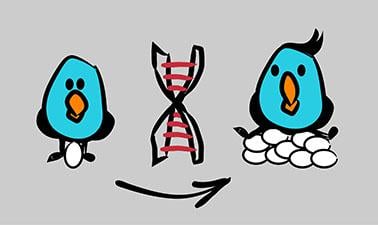- Level Awareness
- Ratings
- Course by Wageningen University & Research
- Total students 2,644 enrolled
-
Offered by

About
Animal breeding involves the selective breeding of domestic animals with the intention to improve desirable (and heritable) qualities in the next generation. This course introduces the steps required to design a program for breeding animals and teaches the genetic and statistical concepts that are needed to build a solid breeding program.
In this course you will learn how an animal breeder balances the need for improving desirable qualities of the animals with the need for genetic diversity and long sustainability of the program. The scientific concepts in genetics that are applied in animal breeding will be explained and you will learn to apply the models and computational methods that are used in animal breeding.
Prerequisites
Knowledge in the area of statistics at 2nd or 3rd year university level is needed to follow this course successfully.
For whom
Professionals working with animals will use the knowledge from this course to understand the impact of breeding on their populations, and will be able to include the genetic principles in their decisions. For further studies such as M.Sc. level courses in breeding and genetics, this course will allow you an advanced starting point.
Although this course is open to everyone, it is particular useful for breeders of:
- Cows
- Poultry/Chicken
- Horses
- Pigs/Swine
- Dogs
- Sheep
- Goat
- Fish
- Shrimp
Professional Certificate Program
This course is part of the Professional Certificate Program "Animal Breeding and Genetics". Join the other course in the program, Evaluating Animal Breeding Programs, and advance your career as a breeder.
The course is developed with financial support and input from the Koepon Foundation and the African Chicken Genetic Gains project.
What you will learn
- The steps required in setting up a breeding program.
- Understanding of the main concepts in animal breeding.
- Applying genetic models and tools to predict the breeding value of animals.
- Applying tools to predict genetic change and/or inbreeding in populations.
- Understand the dissemination of genetic progress in different animal
Skills you learn
Syllabus
Module1: Introduction to Animal Breeding
Introduction to the seven steps that are needed to set up a breeding program.
Module 2: The breeding goal
Learning the characteristics of a breeding goal and how to define a breeding goal for genetic improvement and for genetic diversity.
Module 3: Collection of information and family relationships Learning the value of information on relationships, performance, and DNA information, including the concept and consequences of inbreeding. Learning methods to quantify relationships and inbreeding.
Module 4: Genetic models
Learning the concept of genetic models and to apply suitable genetic models for different traits. Learning the genetic concepts of heritability, repeatability, common environment ratio and mendelian sampling.
Module 5: Ranking the animals
Learning to estimate the breeding value of animals, using single or multiple sources of information, including DNA information. Learning to calculate the accuracy of estimated breeding values.
Module 6: Response to selection
Learning to calculate the response to selection and knowing its key elements and consequences of trade-offs between them. To understand mating schemes and long term contributions to inbreeding.
Auto Summary
Discover the intricacies of selective breeding with the "Genetic Models for Animal Breeding" course by edX. Designed for professionals in the science and engineering domain, this course delves into genetic and statistical concepts essential for animal breeding programs. Ideal for breeders of various animals including cows, poultry, and dogs, it balances improving desirable traits with genetic diversity. With prerequisites in statistics, it serves as a foundation for advanced studies in breeding and genetics. Enhance your expertise and career with this engaging and comprehensive course.

Hans Komen

Han Mulder

Piter Bijma

John Bastiaansen

Mario Calus


